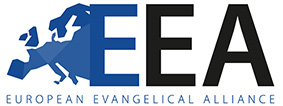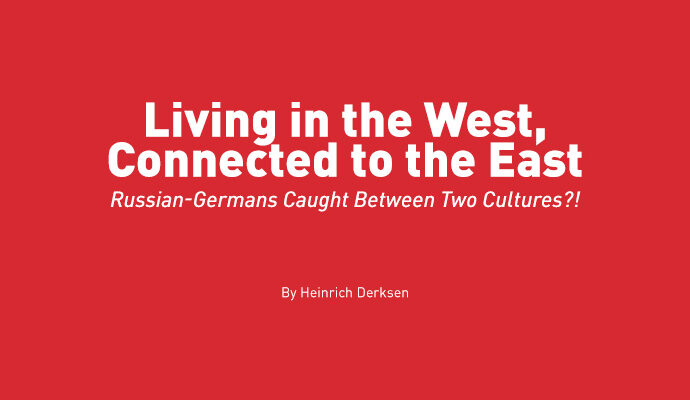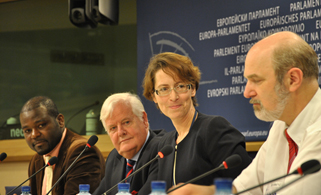When my parents and I came to Germany in 1976, I had no idea how much coming from Russia would shape my life and my identity. In Russia, we were called fascists and Germans. Here in Germany, I heard in the schoolyard: “Those are the Russians!”. The few Russian-German children in elementary school stood out because of their language, clothing, and behavior. We spoke German with an accent and made many mistakes. We wore old clothing that had been given to us. We also stood out because of our odd interactions. This always challenged me as a child. Who am I really? German or Russian? I am a German from Russia! My hybrid cultural context has helped me to develop a “dual identity”, which has often proved helpful. It helps one to be more empathetic in dealing with other cultures and perspectives.
When large numbers of Germans immigrated from Russia at the end of the 80´s, intercultural challenges intensified again. Within a few years, 2.5 million people from the former Soviet Union moved to Germany. There was great tension between the migrants and mainstream society. We frequently heard phrases like: “They are taking away our jobs. They live at our expense. They build houses because they get everything financed. With their big families, they only benefit Aldi and Lidl.” Moreover, many found it difficult to understand this heterogeneous group. Not all Russian-Germans are Germans from Russia. There are multi-cultural and multi-national families. The husband is Russian, the wife is German. The husband is German, the wife has a Ukrainian father and a Russian mother. This led to Russian being spoken at home in many families. People enjoyed Russian dishes and listened to Russian music. Many still had family members, friends, and acquaintances in Russia. This created another bridge to their former “homeland.” Some, due to their language skills and experience in this region, have oriented their small businesses toward Russia and have established good relationships there. But there are also many Russian Germans who have developed an inner aversion to Russia and the people there. They were discriminated against and persecuted in Russia, so they want nothing more to do with that country. They got rid of their Russian passports as quickly as possible, even though this was costly, because they wanted to integrate and assimilate in Germany.
While the Protestant and Catholic Russian-Germans were integrated into the national churches quickly, only a few free church members felt at home in the existing churches in Germany. Because of this, at least 1200 free churches have been planted in the last 50 years. These churches, often referred to as “prayer houses” can be easily identified. They have typically been built in industrial areas using their own manpower. The largest congregation in Bielefeld has well over 3000 members. The churches are similarly as heterogeneous as the Russian-Germans as a whole. There are at least 12 denominations, but over 50 percent of the churches are autonomous and self-sufficient and are not connected to any denomination. There are three main streams that can be identified within the movement. The exclusive churches keep to themselves and have quite restrictive church rules. The conservative churches hold to a Russian-German understanding of church and the Bible, but they are open to other congregations and Christians. The progressive churches have essentially assimilated and are often no longer perceived as Russian-German at all. In this respect, the different streams do not collaborate directly with each other. Some churches are well-integrated in the community; others live more segregated lives.
Up to this point, Russian-Germans have rarely been active in politics. During my meeting with the former German Chancellor Angela Merkel, she asked me why this was so. The reason is that in Russia the government was hostile to Christians and to Germans. In the Soviet Union, people were discriminated against and disadvantaged. People are very grateful that the German government grants freedom of religion and opinion but are only gradually beginning to see political involvement as an opportunity and a mission. Heinrich Zertik (CDU) was the first Russian-German member of parliament in Germany from 2013-2017. In the meantime, others have also become politically active in other parties at the federal, state, and local levels. Nevertheless, many Russian-Germans remain critical of mainstream society, media, and politics. During the Corona crisis, regulations were often perceived as threats to freedom. Unfortunately, this has occasionally led to tensions between Russian-Germans and local governments, and in some places, has received negative media coverage.
In the current crisis in the Ukraine, only isolated voices, which have been influenced by Russian media, are pro-Putin. The majority of Russian-Germans are against war and do not support Putin’s aggression. However, this does not mean that they reject the Russian people, Russia as their former homeland, or the Russian language, culture, and traditions. The Russian-Germans may have moved from the East to the West, but the East has not moved out in the West. Being drawn toward Russian culture does not mean being pro-Putin. Unfortunately, this distinction is not often made in society, and so new aggression against Russian-Germans is again occurring sporadically, which is very regrettable. The German Intelligence Service explicitly pointed out in a panel discussion, in which I was a participant, that Russian Germans are not a danger to Germany. Russian Germans are fully-integrated and established professionally. They are at home in Germany, but as a community they form a subculture on the basis of their historical roots. They emigrated from Germany to Russia 250 years ago, preserved and cultivated their German culture there, and returned home shaped by their experiences and the Russian culture that surrounded them. Yet if Germany as a pluralistic country claims to be multi-cultural and multi-religious, then Russian-Germans in Germany should also be part of society and not caught between two cultures.
Dr. Heinrich Derksen is the principal at the Biblical Seminary in Bonn/Germany and teaches practical theology, Greek and New Testament exegesis. He is also a member of the main board of the Evangelical Alliance Germany.












